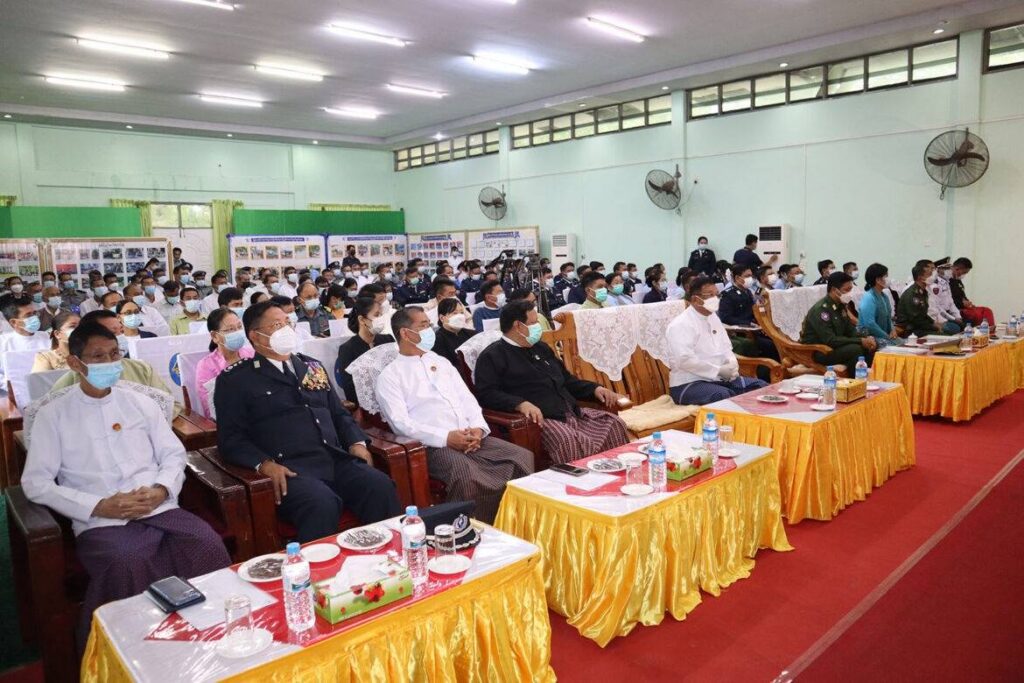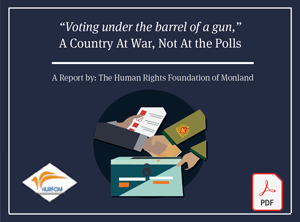Military Officers Embedded in Civilian Committees as Junta Tightens Control in Mon State
September 29, 2025
HURFOM: In Mon State, the junta has tightened its grip on civilian life by embedding military officers into township administration and management committees as part of its preparations for a sham election. Officers at the rank of Major are no longer just sitting as representatives, but are also taking leadership positions across key departments.
This militarization has translated into daily hardships for ordinary people: travel is restricted, trade routes are blocked, access to information is censored, and basic freedoms are stripped away. Local residents told HURFOM that their right to move, work, and live with dignity is being consistently violated. These repressive measures are fueling fear and mistrust, forcing families to flee and deepening the cycle of displacement that communities have endured for decades.

On July 31, the Junta issued instructions mandating that all township administration and management committees must be formed with seven members, including one mandatory military representative. Following this directive, new committees were formed in early August in townships including Mawlamyine, Kyaikhto, Paung, Bilin, Mudon, and Thanbyuzayat. Residents in Mudon reported that decision-making has already become more rigid with military representatives at the table.
A former civil servant who wants to remain anonymous, and who is also close to the Mudon township administrative office, explained:
“Military officers have long interfered in civilian administration and management, but what we see now is different. Almost every level of the committees has been systematically filled with junta representatives, particularly officers at the rank of Major who were appointed just last month. This is clearly part of a broader strategy. For the junta, securing Mon State is critical to ensure their planned election can be staged smoothly and the outcome declared in their favour. For ordinary people, however, it only means more restrictions on their daily lives—less freedom to move, more surveillance, and tighter control at every layer of administration.”
Local sources confirmed that township meetings are now being held more frequently, with security for the election a constant topic of instruction. In Paung, for example, not only does the committee include a Junta representative, but the head of planning, the township legal officer, and even the township administrator are military appointees.
“Here in Paung, the planning department chief, the township law officer, and the administrator are all military officers. This means every decision will be closely controlled,” a local contact explained.
Meanwhile, residents are facing intensified surveillance and restrictions on social media use, cross-border trade, and freedom of movement.
Similar appointments have been reported in other states and regions, not just Mon State. The Junta’s attempt to embed military personnel into administrative structures follows its long-standing pattern of reshuffling leaders at both civilian and military levels. Now, it is reaching further down into township and village administration in an effort to consolidate control.
At the same time, the pressure is creating deep dilemmas for village administrators. Faced with threats from the junta on one side and warnings from resistance forces on the other, several local administrators have resigned from their posts this year rather than continue working under junta control.
“This shows just how determined the junta is to turn what should be civilian administration into another extension of its military machine — all just to stage an election that no one believes will be free or fair,” said a 65-year-old former Mon p… Read more




















































